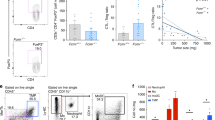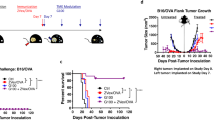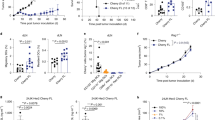Abstract
Daily treatment of mice with recombinant human Flt3 ligand (huFlt3L) results in a dramatic numerical increase in the number of dendritic cells (DCs) in vivo. Since DCs are pivotal in the induction of immune responses, we tested whether Flt3L treatment of mice challenged with a syngeneic methylcholanthrene (MCA)-induced fibrosarcoma would augment the generation of effective antitumor immune responses in vivo. Flt3L treatment not only induced complete tumor regression in a significant proportion of mice, but also decreased tumor growth rate in the remaining mice. A preliminary characterization of the cellular mechanisms involved suggests that Flt3L may be important in the treatment of cancer in situ through the generation of specific antitumor immune responses.
This is a preview of subscription content, access via your institution
Access options
Subscribe to this journal
Receive 12 print issues and online access
$209.00 per year
only $17.42 per issue
Buy this article
- Purchase on Springer Link
- Instant access to full article PDF
Prices may be subject to local taxes which are calculated during checkout
Similar content being viewed by others
References
Pardoll, D.M. Paracrine cytokine adjuvants in cancer immunotherapy. Annu. Rev. Immunol. 13, 399–415 (1995).
Liu, B., Podack, E.R., Allison, J.P. & Malek, T.R. Generation of primary tumor-specific CTL in vitro to immunogenic and poorly immunogenic mouse tumors. J. Immunol. 156, 1117–1125 (1996).
Metlay, J.P. et al. The distinct leukocyte integrins of mouse spleen dendritic cells as identified with new hamster monoclonal antibodies. J.exp Med. 171, 1753–1771 (1990).
Kraal, G., Breel, M., Janse, M. & Bruin, G. Langerhans' cells, veiled cells, and interdigitating cells in the mouse recognized by a monoclonal antibody. J. Exp.Med Annu. 163, 981–997 (1986).
Jiang, W. et al. The receptor DEC-205 expressed by dendritic cells and thymic epithelial cells is involved in antigen processing. Nature 375, 151–155 (1995).
Steinman, R.M. The dendritic cell system and its role in immunogenicity. Annu. rev. Immunol. 9, 271–296 (1991).
Mayordomo, J.I. et al. Bone marrow-derived dendritic cells pulsed with synthetic tumour peptides elicit protective and therapeutic antitumour immunity. Nature Med. 1, 1297–1302 (1995).
Thomson, A.W. et al. Microchimerism, dendritic cell progenitors and transplantation tolerance. Steem Cells. 13, 622–639 (1995).
Young, J.W. & Inaba, K. Dendritic cells as adjuvants for class I major histocompatibility complex-restricted antitumor immunity. J. Exp. Med. 183, 7–11 (1996).
Zitvogel, L. et al. Therapy of murine tumors with tumor peptide-pulsed dendritic cells: dependence on T cells, B7 costimulation, and T helper cell 1 -associated cytokines. J. Exp. Med. 183, 87–97 (1996).
Celluzzi, C.M., Mayordomo, J.I., Storkus, W.J., Lotze, M.T. & Falo, L.D. Jr. Peptidepulsed dendritic cells induce antigen-specific CTL-mediated protective tumor immunity. J. Exp. Med. 183, 283–287 (1996).
Paglia, P., Chiodoni, C., Rodolfo, M. & Colombo, M.P. Murine dendritic cells loaded in vitro with soluble protein prime cytotoxic T lymphocytes against tumor antigen in vivo. J. Exp. Med. 183, 317–322 (1996).
Mckenna, H.J. & Lyman, S.D. Biology of Flt3 ligand, a novel regulator of hematopoietic stem and progenitor cells. in Bone Marrow Transplantation: Basic and Clinical Studies (eds. Ikehara, S., Takaku, F. & Good, R.A.) 85–93 (Springer, New York 1996).
Lyman, S.D. Biology of Flt3 ligand and receptor. Int. J. Hematol. 62, 63–73 (1996).
Maraskovsky, E. et al. Dramatic increase in the numbers of functionally mature dendritic cells in Flt3 ligand-treated mice: Multiple dendritic cell subpopulations identified. J. Exp. Med. 184, 1953–1962 (1996).
Brasel, K. et al. Hematological effects of Flt3 ligandin vivoin mice. Blood 88, 2004–2012 (1966).
Brent, L. & Medawar, P.B. Quantitative studies on tissue transplantation immunity. VIII. The effect of radiation. Proc. R. Soc. London (Biol.) 165, 413 (1996).
Lynch, D.H. & Miller, R.E. Immunotherapeutic elimination of syngeneic tumors in vivo by cytotoxic T lymphocytes generated in vitro from lymphocytes from the draining lymph nodes of tumor-bearing mice. Eur. J. Immunol 21, 1403–1410 (1991).
Brasel, K. et al. Expression of the flt3 receptor and its ligand on hematopoietic cells. Leukemia 9, 1212–1218 (1995).
Author information
Authors and Affiliations
Rights and permissions
About this article
Cite this article
Lynch, D., Andreasen, A., Maraskovsky, E. et al. Flt3 ligand induces tumor regression and antitumor immune responses in vivo. Nat Med 3, 625–631 (1997). https://doi.org/10.1038/nm0697-625
Received:
Accepted:
Issue Date:
DOI: https://doi.org/10.1038/nm0697-625
This article is cited by
-
FLT3L-induced virtual memory CD8 T cells engage the immune system against tumors
Journal of Biomedical Science (2024)
-
Screening for CD19-specific chimaeric antigen receptors with enhanced signalling via a barcoded library of intracellular domains
Nature Biomedical Engineering (2022)
-
Flt3 ligand augments immune responses to anti-DEC-205-NY-ESO-1 vaccine through expansion of dendritic cell subsets
Nature Cancer (2020)
-
The role of Langerhans cells in oral squamous cell carcinoma
The Chinese-German Journal of Clinical Oncology (2011)
-
DNA vaccination strategies for anti-tumour effective gene therapy protocols
Cancer Immunology, Immunotherapy (2010)



